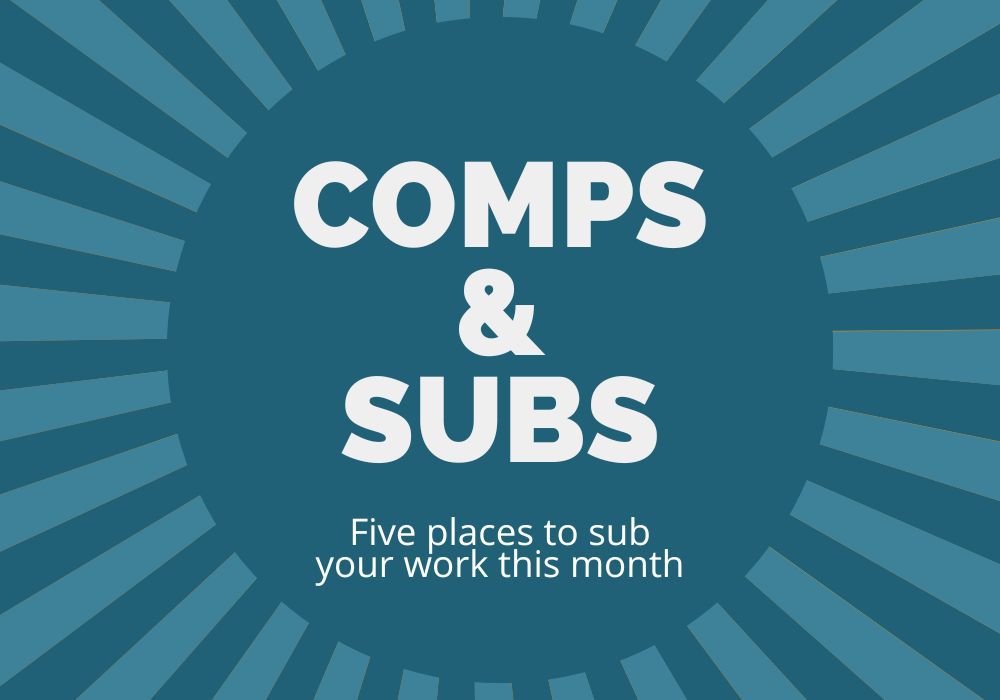As part of our Accessible Submissions For All campaign we’ve been interviewing literary journal editors and writing competition administrators to see the different ways fair, accessible submissions can be managed, and the challenges the lit community faces in the current system. You can read more about our drive to encourage a fairer, more equitable system for submissions and publishing here.
In the latest instalment of our Accessible Submissions project we interviewed Matt Freidson from Creative Future – an absolutely brilliant organisation that supports underrepresented writers in the UK.
INTERVIEW WITH MATT FREIDSON AT CREATIVE FUTURE

What’s the Creative Future Writers’ Award’s model for fees/payment and how has it changed over the years?
The CF Writers’ Award has been free since its inception in 2013. We are a charity with the aim of finding, nurturing, supporting and celebrating under-represented writers—including those who lack opportunities due to mental health, disability, health, and from working class, LGTBQIA+, and Black, Asian and ethnic minority backgrounds. Since our whole remit is to eliminate barriers to access, we’ve held firm to not charging an entry fee. We have looked at introducing either a small fee (£2-3) or ‘pay what you can,’ but our current submission portal can’t technically accommodate this. We’re able to do this because we grind away at cobbling together external funding every year. Without that, we wouldn’t be able to run it at all.
Our prizes are pretty amazing—all together, they’re worth £10,000. But the biggest cash prize we offer is £100, and the rest is provided in kind by our very, very generous partners. The fact is, unless a cash prize is around £1,000 or more, it’s not going to buy a writer much writing time. So our package of development prizes, courses, guides/subscriptions takes writers to another level—alongside publication (for many it’s their first), and meeting industry leaders at our awards showcase. Finally, since writers get long-term support from us indefinitely, our winners are getting quite a lot.
Can you give us an idea of the running costs/time involved in running a competition? Are you able to pay/reimburse your readers/judges/administrators?
CFWA is one of the major project Creative Future runs. Aside from the competition, there’s also an anthology/e-book, national workshop programme, ongoing support for past winners, Writers’ Day events and a high-profile awards ceremony/showcase. This all costs tens of thousands of pounds per year, plus very generous contributions of in-kind support in partner prizes, help with promotion, venues, etc. It requires a good deal of time for our three part-time staff.
We pay our Chief and Guest judges, and are very grateful to the other two judges for giving their time in-kind. We usually don’t have enough money to pay readers and do this in-house since it doesn’t seem fair to ask volunteers to do it for free.
As a writer, how do you feel about entry fees and payment?
I think the two things need to be balanced—competitions should ask for entry fees commensurate with the prizes (and usually the fees fund the prizes). But if you’re looking at literary competitions from the point of view of how much you’re willing to invest vs. how much you could win, you should probably try the stock market. Literary prizes are affirmations of great work and build careers. You shouldn’t either be trying to subsidise your writing time by winning cash prizes, nor should you be ploughing significant money into entering these.
Part of the problem is that usually entry fees x submissions = cash prizes/payments. So, competitions are charging say £25 to enter in order to generate a £1,000 cash prize—creating prominence and a lot of interest. But this has created a false and exclusionary economy.
With the current lack of external funding, how can we make the lit mag community more self-sufficient? (Or do you think there needs to be more investment by larger publishers/orgs so the onus is less on editors/writers?)
More and more literary magazines are moving online to eliminate the costs associated with a printed version, as well as being wholly volunteer-run. This isn’t a new trend at all, but it’s now a lot easier to collect fees and donations online, as well as turning your magazine into an e-book rather than just on a website. Crowdfunding, print-on-demand and initiatives like Unbound have also enabled new ways of being self-sufficient.
Also, the move to online submission portals has been brilliant for making and managing submissions, but these portals cost significant amounts of money as well—further driving up entry fees. It’s recently launched, but I have high hopes for Duosoma in alleviating this problem (it doesn’t offer enough customisation for CFWA to be able to use it yet). We’re very grateful that Zealous has been extremely accommodating and generous in working with us.
What are some ways writers can support lit mags?
This might sound crazy, but hear me out: literary magazines are meant to be read. So buy. The. Magazine. Even from a self-centred standpoint, you’ll see what kind of work they publish and whether yours is a good fit. This is true about CFWA and our anthologies as well.
What are some ways lit mags/competitions can make it easier for low income/marginalised writers to submit?
Primarily, ensuring any entry/reading fees are as low as possible. Putting in place a ‘pay what you can’ with a low minimum floor is a good way level the playing field, and those who can pay more will often do so. Finally, if you have to charge an amount which low-income writers can’t afford, definitely either offer a discounted rate or a limited number of free places. There’s also the ‘pay it forward’ model by which people pay a double entry fee, creating a free one, but this is too unpredictable to ensure you have a respectable number of free slots.
Also: Do NOT ask people to prove they are on a low-income. It’s degrading and time-consuming. You’ll just get less takeup of it anyway—because you’re trying to reduce barriers by…putting up a barrier. If you’re really worried that the Baroness of Stilton-on-Water is going to duck out of your entry fee, try something else.
But money isn’t the only factor. Hearing about your opportunity in the first place isn’t always going to happen for writers on the margins—not everyone is on social media; not everyone looks at competition listing sites. We do extensive outreach to promote CFWA to writing development agencies, health & social care agencies/grassroots groups, writing groups, and so on.
Finally, literary magazines and competitions need to be upfront and pro-active in ensuring under-represented writers feel welcome and confident they can and should submit—that there’s a place for them. Highlighting your interest in your call out/mission statement prominently is key.
Why/do you think it’s important for lit mags/comps to be more accessible?
Literature thrives on new voices. Literature is how we walk in other people’s shoes and see through their eyes—so what better way to create a more inclusive, empathetic and less divided society than to hear the voices of those we don’t usually hear? And these new voices have new things to tell us, new places to show us, and new things to say.
Enormous thanks to Matt Freidson and Creative Future for these insights into the workings of their organisation. If you enjoyed this interview, please go and check out the amazing resources and opportunities at Creative Future, and keep on spreading the literary love…





